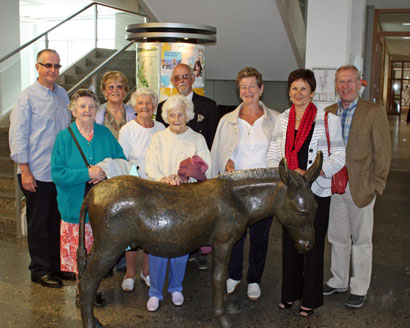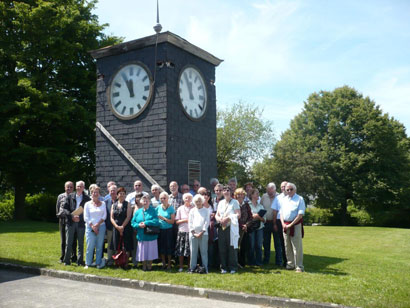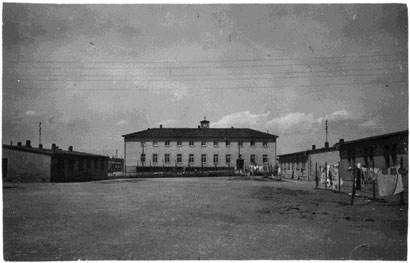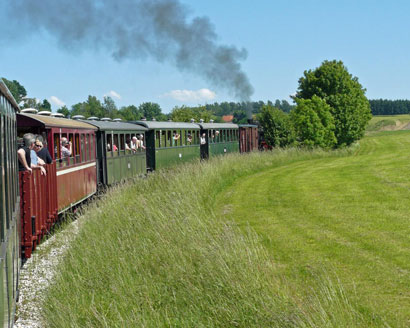Biberach an der Riss, visit by deportees 13 – 18 June 2012
It is nearly 70 years since hundreds of people were deported on Hitler’s orders from Guernsey in September 1942.
The Guernsey Deportees’ Association received an invitation to visit Biberach an der Riss in 2012 from Oberbürgermeister, Thomas Fettback.
Tom Remfrey, Chairman of the Association, organised the travel, flying to Zurich with Blue Islands where the party was met. Other members of the group, travelled independently. All, 17 people had a link either personally or through relatives, and most had visited Biberach on previous occasions.
Tom Remfrey, Chairman of the Deportees’ Association noted that this year’s deportees visit to Biberach was as memorable as the previous visits in 1997, /98/ 2002 and re-affirmed the special relationship which has developed between all sectors of our community.
Tom said: “ During the dark days of our imprisonment at Lindele Camp, we had little opportunity or freedom to appreciate the cultural history or the beauty of the countryside around Biberach, or to meet the people who lived there then. Today that has changed. In the hell of war so many of the ex deportees remember the hardship and uncertainty of the interned years when everyday life seemed grey and colourless. Today we meet Biberachers and feel genuine affection for them and marvel at the richness of their historical culture and the beauty of their architecture and countryside”
The Biberach Friends of Guernsey Association, Rotraud Rebmann, Helga Reisser, the Biberach Twinning Association, Dr. Wolfgang Grimm, and Sabine Engelhard from the town culture department, had prepared a well organised programme for us which included cultural and social events with tasty meals. Old friendships were strengthened and new ones formed.
Our activities were:-
Thursday 14th
A guided tour of the medieval town focused on the craft settlement area of Weberberg, where at the start of the 16th century 400 weaving looms were located to weave the flax which grew in abundance in the area. The industry brought wealth and trading links to Biberach.
Councillor Frau Marlene Goeth officially welcomed us at the Biberach town hall.
Frau Stephanie Burkle and Dr. Schmid, of Biberach Landratsamt, the council responsible for the district of Biberach hosted our lunch which was a Swabian meal.
In the afternoon visits were offered to Bad Buchau, a spa town or Bad Schussenried.

Friday 15th, We visited Bereitschaftspolizei formerly Lindele Camp and now the principle police training centre for Baden Württemberg area. Police Commandant Herr Schilling gave a guided tour and young recruits demonstrated their police training skills. Lunch was provided for us in the Police canteen.
For many in the party, emotions and memories came flooding back of the 3 years that they had been incarcerated in Lindele camp, now completely demolished. Only the original clock tower, now placed on a grassy area and a model of the old camp remains to be seen. A similar model, made by the police has been presented to the people of Guernsey.

Saturday 16th
We started the day at the vibrant Biberach market in the town square. It has been a vital part of Biberach community life for centuries. This is where friends meet for a chat over coffee and then to buy fresh fruit, bread, meat, cheeses, and plants from the stalls.
Little has changed about the market over the years. It is still the same as my memories of it in the 60’s when I lived in Biberach with the Koch family. Maria was a very special friend of my mother Gladys Skillett, having both met whilst giving birth to their sons at the Biberach hospital in 1943. Gladys was the first woman in the camp to give birth in Biberach.

Sabine took my brother David, and I to a local viewpoint near the camp and we discovered the exact spot where my father had painted a picture of the distant town of Biberach. The artist materials had been sent by Red Cross parcel and my father often took advantage of being able to leave the camp and paint. There were few camp guards during the later period of the war.
A first for all of us was a special train ride on the “Őchsle” which dates from 1899 and travels from Biberach/Riss to Ochsenhausen, I did wonder whether this was used by camp people, as transport to the hospital. Perhaps this was how my mother travelled to Ochsenhausen where she spent 3 weeks awaiting my birth?
The group then visited the monastery and cemetery before being driven back to Biberach.

In the evening, we attended the open air concert in the Museum courtyard, to celebrate the 30th anniversary of the founding of the St. Martin’s Boy’s Choir, held to raise funds for a special musical work. Many ex choir boys had formed small choir groups, each with an individual style and really wowed and entertained the large crowd. This choir has visited Guernsey twice and been hosted by Guernsey families.
This was a wonderful event and very much enjoyed although it called for stamina to sit through the 3 hours concert not only for some of the older people in our group whose ages reached 93.
Sunday 17th
The church service in the beautiful baroque church of St. Martin was very special. The Biberach Kantorei’s exquisite singing resonated through the church. Next year during the annual Schützenfest folk festival the Guernsey Choral Society will join them in the church.
Pfarrer Eberhardt Göhner, a long time member of the Biberach Friends of Guernsey and Pfarrerin Birgit Oehme, baptised 4 babies during the service and welcomed the guests from Guernsey. I read the lesson and said two prayers and felt very privileged and moved to have been asked to participate in the service.
I remembered the devotion of Maria Koch, my mother’s friend, who attended the church every Sunday, (I had occasionally accompanied her in the 60’s whilst living with the family) How surprised and delighted both she and my mother, bonded for life through the shared experiences of childbirth and war, lifelong friends, would have been to see me standing at the altar in front of the large congregation. Biberachers and Guernsey people 70 years on joined together, as they were through reconciliation and friendship.
We then visited the protestant cemetery. The simple headstones on the graves of the Guernsey deportees who died in the camp lie in a shady spot and are well tended. Each of us laid a yellow rose on every grave, including baby Cecil Norman and 3 yr old Rex Wearing. The Boon brothers, laid a rose on their Grandfather’s grave. Our thoughts and prayers cantered on those who had died in war torn Germany, far away from their homes.
I then visited the Catholic cemetery to lay a yellow rose on the grave marking the names of George Wilkinson and 2 year old Marsha Streathem. How sad parents must have been to leave their little children behind in Germany when they returned to Guernsey.
We proceeded to the memorial erected to the Channel Islanders who had died in Biberach and the memorial to all the Biberach people killed in the bombing raid of April 1945 on the town. Tom Remfrey laid flowers with prayers for all who had died.
The town council hosted lunch at “die Pfanne” restaurant in Rissegg, well known for its local specialities. Many of the group then visited Bad Wurzach, where the Jersey deportees had been incarcerated in the castle near the town centre. Frau Rotherhausler led a tour of the castle.
A social evening, hosted by Wolfgang Grimm and members of the twinning organisation, held at the church hall Dreifaltigkeit was another opportunity for memories of the past and hopes for the future to be shared.
Frau Sikora opened the evening by telling us of the events and of her meeting in 1995 with my mother Gladys Skillett. Frau Sikora knew the story of Glady’s lifelong friendship with Marie Koch and of other deportees friendships over the years with Biberach people, met during their time in camp. She was determined to help lay the foundation for the ultimate reconciliation of all deportees 1997.
The perseverance of Oberbürgermeister Thomas Fettback and the major role he played politically in effecting the reconciliation, earned him respect which was recognised by his award of the OBE from Queen Elizabeth on the 60th anniversary of the Liberation, 9th May 2005 at Beau Sejour. On leaving office this year, he described the reconciliation and receiving this honour as being the highlight of his career.
Frau Sikora as founder of the Ikebana group went on to explain that the exquisite Japanese floral flower arrangements decorating the tables symbolized– Peace.
Members of the Biberach Friends of Guernsey and the Twinning Association provided a traditional dinner and a delicious array of homemade cakes and deserts.
We greatly appreciated the effort made for us. The social evening nurtured the growth of new and old friendships and discussion.
More interesting details and facts were revealed during the visit. We were intrigued by an autograph book and photographs of camp life that had belonged to Juliette Lester’s mother, an internee. The camera had probably been traded during the period after the camp was liberated by the French on April 23rd and before the internees were repatriated to England in June.
Irene Shorrock recognised an entry in the autograph book made by her mother’s cousin, Kath Scriven. A Poem of Dorsten written by Mary Roche detailed the dreadful state of this first camp that the deportees stayed in for about 6 weeks before being sent on to Biberach.
I met Peter, a Biberacher who helped his father in their market garden close by Lindele camp. He remembered a lady and 2 little girls coming from the camp to help out in return for fresh fruit and vegetables. Like my brother Colin, he also remembered the aircraft crashing nearby to the camp. He showed me a book detailing all aircraft crashes in that region before and during the war. The crash was listed as a training practise “dog flight” in April 1945. I was told that often practice “dog fights” took place over the camp by aircraft training from a nearby airfield.
Memories of the past will never be wiped out, but the visits to Biberach have allowed insight and understanding of the events of the war and the lifelong impact on this group of islanders.
Our time in Biberach was exceptional, our hosts had planned each day so well and the hospitality and kindness shown to us made our visit a very happy occasion.
GLORIA DUDLEY-OWEN
TREASURER, FRIENDS OF BIBERACH
JULY 2012
Photos Alan Chubb

